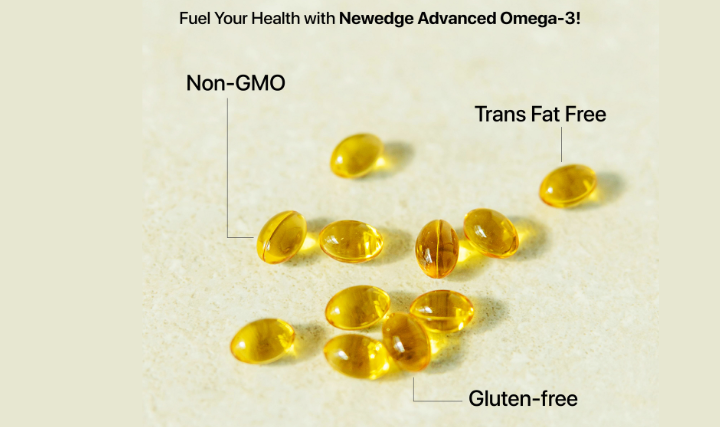
Why You Might Need Omega-3 Supplements Even If You Eat Chia Seeds
Many health-conscious individuals incorporate chia seeds into their diet as a natural source of omega-3 fatty acids. While chia seeds are indeed nutritional powerhouses, they may not provide all the omega-3 benefits your body needs. At Newedge Healthcare, we believe in providing comprehensive information to help you make informed decisions about your health journey.
Understanding the Role of Omega-3 Fatty Acids in Your Health
Omega-3 fatty acids are essential polyunsaturated fats that play crucial roles in brain function, reducing inflammation, supporting heart health, and promoting overall well-being. These powerful nutrients cannot be produced by your body and must come from your diet or supplements.
Research has linked adequate omega-3 intake to numerous health benefits, including:
-
Reduced risk of cardiovascular disease
-
Improved cognitive function
-
Decreased joint pain and inflammation
-
Better mood and mental health
-
Support for eye health
Chia Seeds: A Rich Source of ALA Omega-3
Chia seeds have gained popularity as a plant-based source of omega-3 fatty acids. One ounce (about two tablespoons) of chia seeds contains approximately 5 grams of omega-3 fatty acids in the form of alpha-linolenic acid (ALA).
These tiny seeds also provide fiber, protein, calcium, and various micronutrients, making them a valuable addition to your diet. Many people enjoy adding chia seeds to smoothies, yogurt, oatmeal, or making chia pudding as part of their health routine.
Why ALA in Chia Seeds Isn't Enough for Optimal Health
Here's where the omega-3 story gets more complex. There are three main types of omega-3 fatty acids:
-
Alpha-linolenic acid (ALA): Found in plant sources like chia seeds, flaxseeds, and walnuts
-
Eicosapentaenoic acid (EPA): Primarily found in fatty fish and omega-3 supplements
-
Docosahexaenoic acid (DHA): Primarily found in fatty fish and omega-3 supplements
While chia seeds provide abundant ALA, your body must convert this form into the more biologically active EPA and DHA to receive many of the health benefits associated with omega-3s. Unfortunately, this conversion process is inefficient in humans—typically less than 5-10% of ALA converts to EPA, and less than 2-5% converts to DHA.
The Different Types of Omega-3 Fatty Acids and Their Benefits
Each type of omega-3 serves different functions in your body:
ALA (from plant sources like chia seeds):
-
Provides energy
-
May offer some cardiovascular benefits
EPA (primarily from marine sources):
-
Powerful anti-inflammatory properties
-
Supports heart and cardiovascular health
-
May help manage mood disorders
DHA (primarily from marine sources):
-
Critical for brain development and function
-
Essential component of eye retinas
-
Supports nervous system health
How Omega-3 Supplements Can Fill the Gaps in Your Diet
Given the inefficient conversion of ALA to EPA and DHA, many health professionals recommend direct sources of these essential fatty acids. High-quality omega-3 supplements provide a convenient solution to ensure adequate intake of all three omega-3 types.
At Newedge Healthcare, we recognize that omega-3 supplements can be particularly beneficial for:
-
Vegetarians and vegans who don't consume fish
-
People with limited access to fresh fatty fish
-
Individuals with increased omega-3 needs (pregnant women, athletes, older adults)
-
Those with inflammatory or cardiovascular conditions
-
Anyone seeking to optimize their cognitive health
Quality omega-3 supplements typically contain concentrated amounts of EPA and DHA derived from fish oil, algae oil (for vegetarians), or krill oil. These supplements bypass the inefficient conversion process, delivering the most biologically active forms directly to your body.
Finding the Right Balance
While omega-3 supplements offer significant benefits, we still encourage consuming a varied diet rich in natural omega-3 sources. Chia seeds remain an excellent addition to your nutrition plan for their ALA content and their impressive profile of other nutrients.
For optimal results, consider a two-pronged approach:
-
Continue enjoying chia seeds and other plant-based omega-3 sources
-
Supplement with high-quality omega-3 supplements to ensure adequate EPA and DHA intake
Remember that quality matters when choosing omega-3 supplements. Look for products that specify the EPA and DHA content, have undergone third-party testing, and are free from contaminants.





